
Features
Production
Research
Dorenberg Orchards
Third generation looks to the future
September 16, 2010 By James Careless
Dorenberg Orchards deserves the name “award-winning.”
Dorenberg Orchards deserves the name “award-winning.”
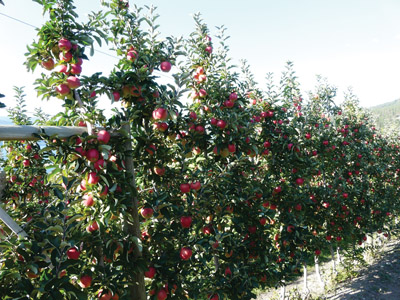
|
|
| Okanagan’s Dorenberg Orchards, owned by Marc van Roechoudt, was awarded the B.C. Fruit Growers’ Association’s Golden Apple Award for 2009. Contributed photos Advertisement
|
In 2009, this family-owned Okanagan orchard won the B.C. Fruit Growers’ Association’s Golden Apple Award. Dorenberg Orchards also won several honours at the Royal Agricultural Winter Fair in Toronto, including First Prize in the Royal Gala and Ambrosia categories (2008 and 2009 respectively).
“The award, it‘s a nice recognition for 50 years of family orcharding,” said Dorenberg Orchard’s owner Marc van Roechoudt. “It‘s also going to make my manager, Raymond Fisher, very happy!”
Marc is the second generation to operate Dorenberg Orchards, which was founded by his father Louis in 1949. Today, Marc’s daughter Madeleine van Roechoudt has joined the family business as office manager after completing her degree in agriculture at the University of British Columbia.
“One day I will be given the reins of the farm, and I have lots of ideas for it,” Madeleine tells Fruit and Vegetable Magazine. “Until then, I am going to learn everything I can from my father and Raymond Fisher.”
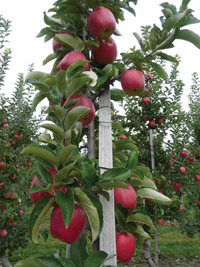 |
|
| Over the years, the orchard has grown varieties such as Discovery, Summerred, Sunrise, Royal Gala, Jonagold, Empire and Braeburn. |
Louis van Roechoudt bought the original sections of Dorenberg Orchards in 1949. The land is located on a hillside in Lake Country, B.C., just north of Kelowna. It was a tough year to get into the business: the peaches and apricots were frozen out during arctic cold weather in January 1950. In addition, the Wealthies (apple variety) returned red ink so van Roechoudt lost money that year.
Undeterred, van Roechoudt soldiered on. As he made money on his existing old trees, van Roechoudt began to replace them with higher-yielding dwarf varieties. By 1967, Dorenberg Orchards had won a Compact Orchard Award from the B.C. Fruit Growers’ Association. But apples weren’t all that Louis and his son Marc grew on their farm, which had expanded to 100 acres. You could also find cherries, prunes and pears.
As time progressed, Dorenberg Orchards focused on apples.
“My father [Marc] was tired of dealing with the splitting problems that cherries experience,” says Madeleine. “Apples seemed a better bet, so the other crops were phased out.”
But the van Roechoudts’ willingness to try something new persisted. Over the years, they experimented with new varieties such as Discovery, Summerred, Sunrise, Royal Gala, Jonagold, Empire and Braeburn.
Not all justified the money spent on them. This is why the farm only grows Sunrise, Royal Gala and Ambrosia today. In 2008 they planted five acres of Riesling grapes.
Priorities
Dorenberg Orchards’ recent awards “are tributes to the dedication of my father and orchard manager Raymond Fisher, who has been with us for the past 18 years,” says Madeleine. But these awards also underline the priorities that have made this farm a success for the past 60 years.
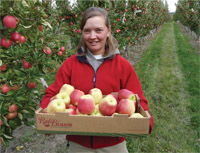 |
|
| Daughter Madeleine van Roechoudt has joined the family business as office manager after completing her degree in agriculture at the University of British Columbia. |
“Quality is our first priority,” she says. “We focus on growing the optimum sized fruit with maximum colour for every apple variety we grow. Our three main varieties are all multiple pick, meaning that we pick them two or three times.”
As a result, Dorenberg Orchards’ harvesters pick based on colour.
“Our people select the apples that are the most ready and leave the rest to get extra colour for the next pick,” she notes.
Careful fruit management is the next hallmark of Dorenberg Orchards’ operations. “We try to reduce the amount of hand thinning by aggressive pruning and chemical thinning early in the season.” Nevertheless, apples still require a lot of manual labour especially at harvest. “We’re on a hillside, so we are unlikely to ever be able to use any kind of mechanical harvester.”
Getting and keeping good people is another Dorenberg Orchards priority. “We value our people, which is why several of them have been with us for more than 10 years,” Madeleine says. “We try to hire locally, but it is not always possible. We’ve had some good luck with working travellers and have also participated in the Seasonal Agriculture Workers Program. Moreover, we pay our harvesters by the hour, not by quantity picked. This prevents people from rushing to grab as many apples as they can, and causing damage to the crop in the process.”
Looking ahead
The van Roechoudt family has always been willing to take risks; from launching the farm in 1949 to trying new varieties of fruit and swallowing losses when they don’t pan out. Clearly some of the family’s gambles have paid off; both in business terms and the quality of their award-winning apples. Most recently, it has brought the family into growing Riesling grapes for local vintners; a market that keeps growing as Okanagan wines gain a world reputation.
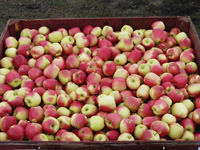
|
|
| Dorenberg Orchards has won several honours at the Royal Agricultural Winter Fair in Toronto, including First Prize in the Royal Gala and Ambrosia categories. |
Like her father and grandfather before her, Madeleine wants to make her mark in the world.
“I would like to do more direct marketing of our produce, and have more control in the branding and sale of our products,” she says. “I can see the benefits of selling directly to premium grocers and restaurants, to enhance the value of the Dorenberg Orchards’ brand.”
But she isn’t going to put everything on the table: at least not yet. Instead, Madeleine would like to see 40 acres farmed as it is now, with the remaining 10 set aside for direct selling. Then she’ll see how well the experiment goes before taking the next step.
“We don’t have to stick solely with apples,” she adds. “There are other markets that we could enter on the direct marketing side, depending on what kinds of fruit people are willing to pay a premium for. The key is to figure out what people want and what we are best suited to grow for them. This will take time, and I am still thinking about it.”
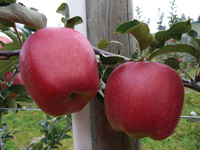 |
|
| Dorenburg Orchards focuses on growing the optimum sized fruit with maximum colour for every apple variety they grow.
|
In the interim, Madeleine is doing everything she can to learn the fruit business from her father and Raymond Fisher.
“I learned a lot at university, but there is nothing like getting hands-on training from people who really know the fruit business,” she says. “I have been apprenticing under Raymond for a few years now, becoming more knowledgeable about all aspects of the farm. I want to be truly ready to take over when the time comes.”
As for the future? If the past is anything to go on, Dorenberg Orchards will continue to be an award-winner once the third generation takes over.
“Like my father and grandfather, my eye is on what is coming next; what produce people are willing to pay top dollar for and what will grow well on our land,” says Madeleine. “That’s what has made us a success so far, and what I believe will continue to work for us in the years ahead.”
Print this page